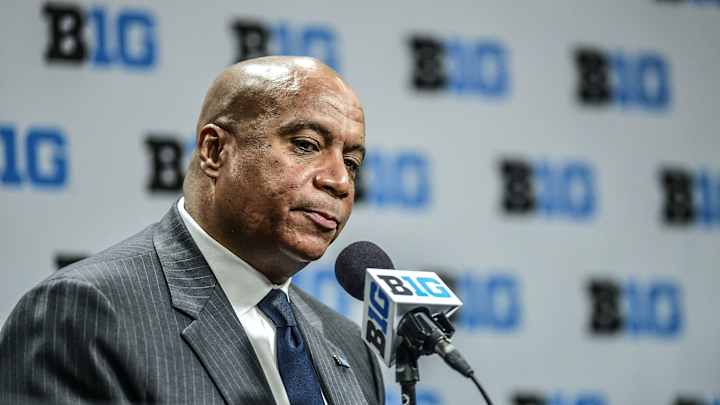Column: Lack Of Unity Across Big Ten Shown On A National Stage

Roughly one week after the Big Ten announced it would be postponing the 2020 fall sports season indefinitely, many across the college football landscape are scratching their heads. So far, the Big Ten and the PAC 12 have pushed fall sports off its 2020 calendar, so when considering Power Five football that leaves the ACC, Big 12 and SEC all in one football-playing boat. People have long known and understood that the NCAA rarely represents college athletics as a whole and is primarily involved as a money-making entity, but never has that fact been more clear than as of right now.
From an outside perspective, the one common thread behind the decisions for each conference is money. In the cases of the Big Ten and the PAC 12, the point of discussion over the last week and a half (from the time the 2020 football schedule was released) until now, likely centered around the financial implications of not playing versus the cost of COVID-19-related lawsuits.
Over that time period, the Big Ten released an updated 10-game schedule, which would appear that the conference was committed to and leaning towards playing the 2020 campaign. Then one week later, all of that positive momentum regarding a season was reversed with the cancellation.
So, for such a large change of direction to occur, what happened? The financial conversation shifted.
Up until that point, a wealth of data regarding the coronavirus pointed towards how young adults are one of the safest demographics in terms of showing symptoms of COVID-19 and overall health. Individuals in this subset, which would include college football players, recover the quickest and enjoy less lingering side effects from a positive test.
However, in recent weeks, a new threat has emerged-- myocarditis, which is inflammation of the heart muscle. Several athletes, such as Boston Red Sox pitcher Eduardo Rodriguez, have developed myocarditis after battling the coronavirus. So, obviously the virus can cause flu-like symptoms for those unlucky enough to contract it, but some of the lasting ramifications could include heart issues, which is a much scarier thought for those in charge of deciding whether football should be played in the fall.
When the major COVID-19 concerns centered around a runny nose, running a temperature or similar conditions, many were not overly concerned and saw the virus as more of an inconvenience than an alarming health issue. Now that the aftermath of a positive test could include an extensive heart condition, the alarm bells are sounding loud and clear. And those bells were heard by those in charge of Big Ten football.
The tug of war between the money brought in from a college football season versus the potential cost of liability and lawsuits that could result from COVID-19 was a struggle that moved back and forth for a while. But the side pulling on liability and lawsuits received a huge boost to its argument with the myocarditis developments.
Though it looks like a weak decision by the Big Ten to cancel football so closely following the re-release of the 2020 schedule, the conference was pretty clearly interested in following its best interests. Unfortunately for a host of kids across the Midwest and East coast, what was best for the Big Ten did not involve playing football this fall. The hope among many is for the virus to be further contained over the fall so that a spring season can be played, but several months will need to pass before it is known whether or not that hope is realistic.
Until then, schools need to find a backup plan in place. If the Big Ten opts not to have a spring football season either, Michigan and other school across the conference cannot be caught sitting on their respective hands. A backup plan needs to be in place so that a course correction can happen swiftly, and a fallback plan for the backup plan would not be a poor idea either.
If anything, the way the Big Ten football season was canceled demonstrated a lack of cohesion across the conference. The schools had not communicated together enough prior to the past couple weeks, and it showed in a non-unified front regarding coronavirus. This should be a lesson in what not to do if future concerns arise.
No one ever wishes for a pandemic to erupt, but it does make quality sense to expect a better response than the one delivered by the Big Ten.
What are your thoughts on how the 2020 football season was handled? Would you have postponed the football season or let it continue? Let us know!
